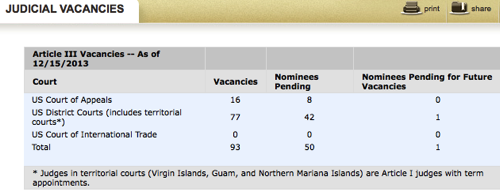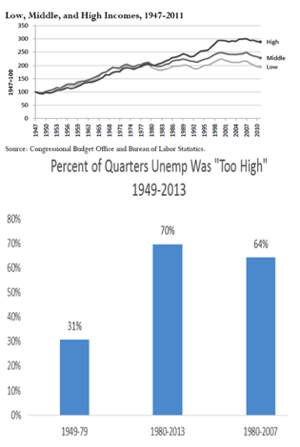Over the weekend, Ezra Klein sparked a lively debate by asking whether “inequality [is] really the country’s most pressing problem.” I would argue that this is among the most important questions that economists should address. But, not necessarily for the reasons that Ezra suggests.
I would start with growth. Our national debate about how the U.S. economy grows is tightly constrained and disconnected from empirical evidence, especially evidence about how inequality affects growth.
I experienced this first-hand in October during a WonkBlog debate that Ezra moderated. On a lovely fall evening, I participated in a lively back-and-forth with Jared Bernstein, Jim Pethokoukis, and Tony Fratto. One thing I noticed is that every time Jim engaged in the conversation, he would, at some point, argue that the best thing to do for economic growth was to keep taxes low. A good way into the conversation, he agreed with the rest of us about the need to make investments in early childhood education. Even here, though, he affirmed this policy while also circling back to his main argument that low taxes are most important for growth.
That’s a perfect example of the state of the debate. There are policy interventions that would reduce inequality, like universal pre-K. But, support for that policy must be weighed against the need for economic growth.
What is disconcerting about this framing is that the weight of the economic evidence is on the side of early childhood education: A growing body of economic evidence suggests that early childhood education may have as large an effect on future productivity and earnings as later interventions to increase skills. If we want the most talented workforce in the world, we may need to focus our energies on reducing inequality in access to high quality early childhood education. Jim may agree with me, Jared, and Tony that investments in early childhood education are important, but in his framing, there’s a growth trade-off. But, what if there is no trade-off?
Economists know that a variety of policy levers can promote economic growth; in the grand scheme of things, taxes are one, but not the only—and maybe not even the most important—tool in the toolbox. Yet, when it comes to debating what policies promote economic growth and stability, we have a narrow conversation that elevates a select few policy issues over a number of potential others. Our national economic debate too often starts from the premise that anything that lowers inequality is probably bad for growth, because it begins from a narrow conception of what makes the economy grow. The story goes something like this: Jobs are created when investors invest. Investors invest when they have enough cash on hand. The available policy levers are to put more or less costly cash in the hands of investors. Once we give investors more money, we cross our fingers that they invest it. In this story, inequality is more good than bad. At the very least, addressing inequality is not among the policy levers that will promote growth.
The questions I think we should be asking are whether and how inequality affects our economy and, is there really a trade-off between inequality and growth? To improve economic growth, should we prioritize low taxes over investments in early childhood education? Or, over increasing access to health care? Or, should our conversation about growth start someplace else, such as what has led to the boom and bust cycle of the past decade or with how inequality affects our ability to actually have a Congress capable of implementing economic policy?
These are big questions, ones that we need to find answers to. I agree with Ezra that unemployment is a critical issue, but we haven’t made much progress is raising the share of Americans with a good job in recent years in no small part because of the limitations of our economic debate.


 Jared Bernstein:
Jared Bernstein: